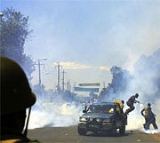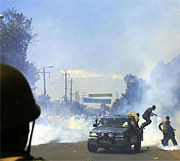
Waki Commission
Encyclopedia
The Waki Commission, officially The Commission of Inquiry on Post Election Violence (CIPEV), was an international commission of inquiry established by the Government of Kenya in February 2008 to investigate the clashes in Kenya following the disputed Kenyan presidential election of 2007.
 The Kenyan presidential election of 2007 was held in December 2007. The main contenders were incumbent President of Kenya, Mwai Kibaki
The Kenyan presidential election of 2007 was held in December 2007. The main contenders were incumbent President of Kenya, Mwai Kibaki
and his former ally Raila Odinga
. The election was strongly marked by tribalism
, with Kibaki coming from the most numerous Kikuyu ethnic group which has dominated Kenyan politics since independence and Odinga an ethnic Luo
allied with other smaller ethnic groups. Kibaki was declared the winner and sworn in on 30 December, despite opposition leader Raila Odinga's claims of victory. Odinga and many international observers claimed the elections were at least partially manipulated. Following the declaration, violent protests erupted particularly in Kibera
, and this included ethnic violence targeted against Kikuyu people living outside their traditional settlement areas, especially in the Rift Valley Province. Luos and Kalenjin were also targeted in the areas surrounding Nakuru
and Naivasha
.
Former UN Secretary General Kofi Annan
brokered a power-sharing agreement which included the appointment of the Waki Commission to investigate the violence.
, a Judge of Kenya's Court of Appeal. The other two commission members were Gavin Alistair McFadyen, a former police Assistant Commissioner
in New Zealand
and Pascal K. Kambale, a lawyer from the Democratic Republic of the Congo
who was working on the Open Society Institute
's Africa Governance, Monitoring and Advocacy Project. The Secretary to the Commission was George Mong’are Kegoro, an advocate of the High Court of Kenya and Kenyan Section Director of the International Commission of Jurists
. The Assisting Counsel was David Shikomera Majanja, an advocate of the High Court of Kenya.
. The Kenyan Government was then given 1 year, beginning July 2009, to setup a Tribunal to deal with issue. Failure to do this would see the ICC would pick up the matter beginning August 2010.
Background

Mwai Kibaki
Mwai Kibaki is the current and third President of the republic of Kenya.Kibaki was previously Vice President of Kenya for ten years from 1978–1988 and also held cabinet ministerial positions, including a widely acclaimed stint as Minister for Finance , Minister for Home Affairs and Minister for...
and his former ally Raila Odinga
Raila Odinga
Raila Amollo Odinga , also popularly known to Kenyans as Agwambo, is a Kenyan politician, currently serving as the Prime Minister of Kenya in a coalition government. He has served as a Member of Parliament for Langata since 1992, was Minister of Energy from 2001 to 2002, and was Minister of Roads,...
. The election was strongly marked by tribalism
Tribalism
The social structure of a tribe can vary greatly from case to case, but, due to the small size of tribes, it is always a relatively simple role structure, with few significant social distinctions between individuals....
, with Kibaki coming from the most numerous Kikuyu ethnic group which has dominated Kenyan politics since independence and Odinga an ethnic Luo
Luo (Kenya and Tanzania)
The Luo are an ethnic group in Kenya, eastern Uganda, and northern Tanzania. They are part of a larger group of ethnolinguistically related Luo peoples who inhabit an area including southern Sudan, northern and eastern Uganda, western Kenya, and northern Tanzania.The Luo are the third largest...
allied with other smaller ethnic groups. Kibaki was declared the winner and sworn in on 30 December, despite opposition leader Raila Odinga's claims of victory. Odinga and many international observers claimed the elections were at least partially manipulated. Following the declaration, violent protests erupted particularly in Kibera
Kibera
Kibera is a division of Nairobi Area, Kenya, and neighbourhood of the city of Nairobi, located from the city centre. Kibera is the largest slum in Nairobi, and the second largest urban slum in Africa...
, and this included ethnic violence targeted against Kikuyu people living outside their traditional settlement areas, especially in the Rift Valley Province. Luos and Kalenjin were also targeted in the areas surrounding Nakuru
Nakuru
Nakuru, the provincial capital of Kenya's Rift Valley province, with roughly 300,000 inhabitants, and currently the fourth largest urban centre in the country, lies about 1850 m above sea level...
and Naivasha
Naivasha
Naivasha is a market town in Rift Valley Province, Kenya, lying north west of Nairobi. It is located on the shore of Lake Naivasha and along the Nairobi - Nakuru highway and Uganda Railway.Naivasha is part of the Nakuru District...
.
Former UN Secretary General Kofi Annan
Kofi Annan
Kofi Atta Annan is a Ghanaian diplomat who served as the seventh Secretary-General of the UN from 1 January 1997 to 31 December 2006...
brokered a power-sharing agreement which included the appointment of the Waki Commission to investigate the violence.
Composition
The chairman of the Commission was Justice Philip WakiPhilip Waki
Philip Waki is a Kenyan judge. He is best known for heading the 2008 Commission of Inquiry into Post-Election Violence, also known as the Waki Commission. He is also the cousin to Lawyer Mutula Kilonzo the personal lawyer to Kenya's Second President Daniel Arap Moi.-References:...
, a Judge of Kenya's Court of Appeal. The other two commission members were Gavin Alistair McFadyen, a former police Assistant Commissioner
Assistant Commissioner
Assistant commissioner is a rank used in many police forces across the globe. It is also a rank used in revenue administrations in many countries.-Australia:...
in New Zealand
New Zealand
New Zealand is an island country in the south-western Pacific Ocean comprising two main landmasses and numerous smaller islands. The country is situated some east of Australia across the Tasman Sea, and roughly south of the Pacific island nations of New Caledonia, Fiji, and Tonga...
and Pascal K. Kambale, a lawyer from the Democratic Republic of the Congo
Democratic Republic of the Congo
The Democratic Republic of the Congo is a state located in Central Africa. It is the second largest country in Africa by area and the eleventh largest in the world...
who was working on the Open Society Institute
Open Society Institute
The Open Society Institute , renamed in 2011 to Open Society Foundations, is a private operating and grantmaking foundation started by George Soros, aimed to shape public policy to promote democratic governance, human rights, and economic, legal, and social reform...
's Africa Governance, Monitoring and Advocacy Project. The Secretary to the Commission was George Mong’are Kegoro, an advocate of the High Court of Kenya and Kenyan Section Director of the International Commission of Jurists
International Commission of Jurists
The International Commission of Jurists is an international human rights non-governmental organization. The Commission itself is a standing group of 60 eminent jurists , including members of the senior judiciary in Australia, Canada, and South Africa and the former UN High Commissioner for Human...
. The Assisting Counsel was David Shikomera Majanja, an advocate of the High Court of Kenya.
Report
The post-election violence report by Waki Commission, commonly known as the "Waki report", was handed over to president Mwai Kibaki and prime minister Raila Odinga on October 15, 2008.. The report has 529 pages . The report however did not publicly disclose the alleged perpetrators in the report handed to the President. The Waki Commission instead handed the list of alleged perpetrators to Kofi Annan. In July, 2009 Koffi Annan handed the envelope to Luis Moreno-Ocampo, the Prosecutor at the ICCInternational Criminal Court
The International Criminal Court is a permanent tribunal to prosecute individuals for genocide, crimes against humanity, war crimes, and the crime of aggression .It came into being on 1 July 2002—the date its founding treaty, the Rome Statute of the...
. The Kenyan Government was then given 1 year, beginning July 2009, to setup a Tribunal to deal with issue. Failure to do this would see the ICC would pick up the matter beginning August 2010.

